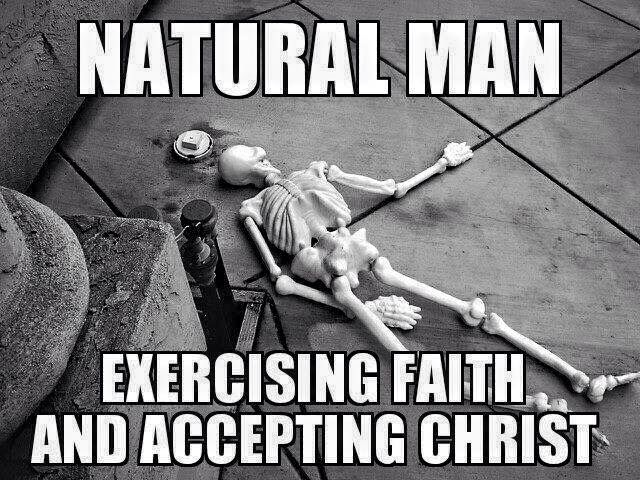I asked for your Scriptural opinions, not for you to copy-paste a poorly written response that not only misunderstands Calvinism, and the five proofs I offered, but Western Christianity as a whole. Once you formulate your own proofs, I'll respond, but until then, I'm not going to waste my time point-by-point refuting a post that not only is against CF forum rules (as it explicitly and numerously calls Calvinists unchristian) but is also poorly researched and written.Calvinism's TULIP OPENS
Their god is not the God of the Bible. Their jesus is not the Jesus of the Bible. They do not know the Holy Ghost. They have no fear of God. They will preach what appears to be a great teaching sermon - sometimes the material is right. This is just like a parrot that mimics human speech. If the parrot says the words right, he can be understood. But the parrot hasn't a clue what he is talking about. But when they preach, they never give the gospel of Christ. They always leave it out, or openly preach a counterfeit gospel.
Heresy is their middle name. They think they are pre-picked to salvation by their Calvinist god by his divine whim before they are ever planted into their mother's womb. (Because they and almost everyone else does not understand the doctrine of predestination). Somewhere along the way they pridefully declare, "I'm one of the elect." And they have nothing to back that statement up with, except that they made the decision one day that they were pre-picked. Bingo, they decided they were saved, end of discussion. Now they are put to scrutiny by all the other pre-picks and if he measures up to their expectations, then he is accepted into the local congregation. No repentance required, no shed Blood of Christ required, and the Scriptures can be damned except that they reinterpret anything and everything that opposes their perspective.
Matthew 26:28 KJV, "For this is my blood of the new testament, which is shed for many for the remission of sins."
Mark 1:4 KJV, "John did baptize in the wilderness, and preach the baptism of repentance for the remission of sins."
Luke 1:77 KJV, "To give knowledge of salvation unto his people by the remission of their sins[.]"
Luke 3:3 KJV, "And he came into all the country about Jordan, preaching the baptism of repentance for the remission of sins[.]"
Luke 24:47 KJV, "And that repentance and remission of sins should be preached in his name among all nations, beginning at Jerusalem."
John 6:47 KJV, "Verily, verily, I say unto you, He that believeth on me hath everlasting life."
Acts 2:38 KJV, "Then Peter said unto them, Repent, and be baptized every one of you in the name of [Yahoshua the] Christ for the remission of sins, and ye shall receive the gift of the Holy Ghost."
Acts 3:19 KJV, "Repent ye therefore, and be converted, that your sins may be blotted out, when the times of refreshing shall come from the presence of [Yahowah]."
Acts 10:43 KJV, "To him give all the prophets witness, that through his name whosoever believeth in him shall receive remission of sins."
Romans 1:16-25 KJV, "16 For I am not ashamed of the gospel of Christ: for it is the power of God unto salvation to every one that believeth; to the Jew first, and also to the Greek. 17 For therein is the righteousness of God revealed from faith to faith: as it is written, The just shall live by faith. 18 For the wrath of God is revealed from heaven against all ungodliness and unrighteousness of men, who hold the truth in unrighteousness; 19 Because that which may be known of God is manifest in them; for God hath shewed it unto them. 20 For the invisible things of him from the creation of the world are clearly seen, being understood by the things that are made, even his eternal power and Godhead; so that they are without excuse: 21 Because that, when they knew God, they glorified him not as God, neither were thankful; but became vain in their imaginations, and their foolish heart was darkened. 22 Professing themselves to be wise, they became fools, 23 And changed the glory of the uncorruptible God into an image made like to corruptible man, and to birds, and fourfooted beasts, and creeping things. 24 Wherefore God also gave them up to uncleanness through the lusts of their own hearts, to dishonour their own bodies between themselves: 25 Who changed the truth of God into a lie, and worshipped and served the creature more than the Creator, who is blessed for ever. Amen."
Romans 3:25 KJV, "Whom God hath set forth to be a propitiation through faith in his blood, to declare his righteousness for the remission of sins that are past, through the forbearance of God[.]"
Romans 5:8 KJV, "But God commendeth his love toward us, in that, while we were yet sinners, Christ died for us."
Ephesians 2:8-9 KJV, "8 For by grace are ye saved through faith; and that not of yourselves: it is the gift of God: 9 Not of works, lest any man should boast."
Hebrews 9:22 KJV, "And almost all things are by the law purged with blood; and without shedding of blood is no remission."
Hebrews 10:18 KJV, "Now where remission of these is, there is no more offering for sin."
1. Many have undertaken to critique Calvinism/Reformed theology. This treatise is not meant to replace those teachings, nor to compete with them. This treatise was written to explain, in no uncertain terms, that Calvinism is not Christian, rather it is an antichrist system.
2.a. Some tenets of Calvinism proffered by Calvinist apologists are presented in the acronym TULIP. There is not a single concept in TULIP that is a Christian doctrine or teaching. Not only is there not a single concept in TULIP that is supported by the Bible, but each concept is destroyed by Biblical teachings. To shine light upon and to expose TULIP for the antichrist system that it is, I have renamed it OPENS.
2.b. T = Total Depravity. What this really means is Calvinism teaches the "Original Sin Heresy". The first letter of the new acronym is "O".
2.c. U = Unconditional Election. What this really means is Calvinism teaches the "Pre-picked Heresy". The second letter of the new acronym is "P".
John 6:47 KJV, "Verily, verily, I say unto you, He that believeth on me hath everlasting life."
Acts 3:19 KJV, "Repent ye therefore, and be converted, that your sins may be blotted out, when the times of refreshing shall come from the presence of [Yahowah]."
Acts 10:43 KJV, "To him give all the prophets witness, that through his name whosoever believeth in him shall receive remission of sins."
2.d. L = Limited Atonement. What this really means is Calvinism teaches the "Exclusivity Heresy". The third letter of the new acronym is "E".
2 Peter 3:9 KJV, "[Yahowah] is not slack concerning his promise, as some men count slackness; but is longsuffering to us-ward, not willing that any should perish, but that all should come to repentance."
2.e. I = Irresistible Grace. What this really means is Calvinism teaches the "No Free Will Heresy". The fourth letter of the new acronym is "N".
John 6:47 KJV, "Verily, verily, I say unto you, He that believeth on me hath everlasting life." Why are we admonished to believe, except that we have a choice. People resist the grace of God all the time - look around.
2.f. P = Preservation of the Saints. What this really means is Calvinism teaches the "Second Time Around Pre-picked Heresy" again. The fifth letter of the new acronym is "S".
You cannot be preserved into something you never had to begin with. If one believes he was pre-picked by God in heaven, before he even left heaven (that thought is heresy too), then that one has not repented of his sin, he has not gone to the foot of the execution stake of Calvary, he is not covered by the shed Blood of Christ.
2.g. So now, instead of TULIP, we have the more descriptive, undisguised OPENS. These renamed heresies now opens the true meaning of Calvinist/Reformed theology. When a tulip fully opens, then it dies.
2.h. Calvinism and Reformed Theology are the same thing. It does not matter which of the many shoots their differing groups and congregations follow from the mother root. Matthew 7:18b KJV, "…neither can a corrupt tree bring forth good fruit." The mother root is an antichrist system of theology and opposes the One True God Yahowah and His Son Yahoshua.
3.a. Total Depravity teaches that man is born not with just a sin nature, but born with sin already charged against him. Scripture does not teach that all mankind has inherited Adam and Eve's first sin. Calvinism and some cults, including the Roman Catholic Cult, teach that we do inherit the first sin. That which the Bible teaches about the sin of the fathers is shown in Ezekiel 18:20 KJV, "The soul that sinneth, it shall die. The son shall not bear the iniquity of the father, neither shall the father bear the iniquity of the son: the righteousness of the righteous shall be upon him, and the wickedness of the wicked shall be upon him." (Also, Ezekiel 18:4). There are some Scriptures that proponents of the Original Sin Heresy misuse to support their position. None of their mistaken exegeses explain the direct contradiction to Ezekiel 18:20; nor, do they explain the logical follow up to this heresy. The logical follow up is that if we inherit the original sin, we should inherit all sin committed by our ancestors. Yet, I have not heard anyone propose that false notion.
3.b. Calvinism teaches that we have inherited the original sin, therefore it only logically follows that all babies are born with sin, and if they die before repenting of their inherited sin, then they are logically condemned to hell.
3.c. Some Calvinists teach that dead babies have an out and are not necessarily condemned to hell. Whatever their reasons for this makes no difference. If they teach that babies have an escape hatch (2 Sa 12:23), then they are being scholarly dishonest. Either we have original sin or we do not. There is no inbetween ground. The notion of Total Depravity cannot exist except the original sin heresy be true.
4.a. Unconditional Election teaches that the god of Calvinism is unjust and arbitrary. Without any reason for making his decision, other than a divine whim, their god pre-picks from the foundation of the world, some to election or salvation and some to condemnation. Scripture does not teach this. The Bible teaches that God elects and predestines people according to their future choices that only He can see. 1 Peter 1:2a KJV, "Elect according to the foreknowledge of God the Father[.]" Romans 8:29-30 KJV, "29 For whom he did foreknow, he also did predestinate to be conformed to the image of his Son, that he might be the firstborn among many brethren. 30 Moreover whom he did predestinate, them he also called: and whom he called, them he also justified: and whom he justified, them he also glorified."
4.b. The Bible teaches that God has foreknowledge. This divine attribute enables God to foresee the future and the future choices that you and I will make in the corridors of time. Based upon those choices that I will make (whether or not to believe that Yahoshua the Christ has provided a Blood sacrifice and atonement for the washing away of my sin) God then predestines me to salvation if I choose to believe or to condemnation if I reject Christ. John 3:15 KJV, "That whosoever believeth in him should not perish, but have eternal life."
5. Limited Atonement teaches that the atonement provided by the Calvinist christ is only applicable to the elect. Scripture does not teach this. This god of Calvinism is a puny god in that he has not the ability to atone for the sins of all men. The Bible teaches that Christ's Blood sacrifice was for the sins of all men. Romans 5:6 KJV, "For when we were yet without strength, in due time Christ died for the ungodly." 1 Timothy 4:10 KJV, "For therefore we both labour and suffer reproach, because we trust in the living God, who is the Saviour of all men, specially of those that believe." Hebrews 2:9 KJV, "But we see [Yahoshua], who was made a little lower than the angels for the suffering of death, crowned with glory and honour; that he by the grace of God should taste death for every man."
6. Irresistible Grace teaches that the elect of the Calvinist's god cannot resist the calling and election of this god. Calvinists claim to be compelled to believe and obey. The Bible does not teach this. The Bible teaches that God desires all to come to Him, but that some will resist His grace and will not believe and come. Luke 22:67 KJV, "Art thou the Christ? tell us. And he said unto them, If I tell you, ye will not believe[.]" 1 Timothy 2:4 KJV, "Who will have all men to be saved, and to come unto the knowledge of the truth." Acts 13:46 KJV, "Then Paul and Barnabas waxed bold, and said, It was necessary that the word of God should first have been spoken to you: but seeing ye put it from you, and judge yourselves unworthy of everlasting life, lo, we turn to the Gentiles."
7.a. The Preservation of the Saints teaches that those pre-picked for salvation are guaranteed to keep that salvation. As explained in paragraph four above, being pre-picked to election is a doctrine of Calvinism, it is not a doctrine of the Bible. Therefore, being pre-picked and preserved in that pre-picking is ludicrous. A paper doctrine cannot support itself, much less another doctrine built upon its back.
7.b. God's plan of salvation for all men does not include pre-picking some to salvation based on a blind divine whim. The true gospel of God would be an entire other teaching. The Scriptural support would be lengthy. But it is appropriate to share at this time a few Scriptures regarding the true Gospel of Christ. Ephesians 1:7 KJV, "In whom we have redemption through his blood, the forgiveness of sins, according to the riches of his grace[.]" Colossians 1:4 KJV, "In whom we have redemption through his blood, even the forgiveness of sins[.]" Hebrews 9:12 KJV, "Neither by the blood of goats and calves, but by his own blood he entered in once into the holy place, having obtained eternal redemption for us."
8.a. Now, with all of this being said about Calvinist/Reformed theology, what is to be said about those who practice this false religion with the mistaken idea that they are pursuing Christianity? I have divided them into three groups.
8.b. One, some, but very few, may actually be Christians. And with all my heart I know that the Holy Ghost will not leave His children inside the halls of this mind trap. I know, because I was once unwittingly involved with Calvinist theology. Christians can be temporarily deceived, but the evidence of their true Christianity can be manifested by their coming out of Calvinism and denouncing it and renouncing their involvement with it. Revelation 18:4 KJV, "And I heard another voice from heaven, saying, Come out of her, my people, that ye be not partakers of her sins, and that ye receive not of her plagues."
8.c. Two, some fully understand that they are involved in an antichrist religion posing as Christian. These have think tanks, plan strategies for infiltration into mainstream Christianity, and actively oppose God. They do this behind the scenes, even hidden from their own followers. I do not have eye witnesses to these think tanks or videos or wiretaps. But for at least fifty-three years I see the evidence by how they operate, how they refuse to be held accountable, and how they refuse to be transparent.
8.d. Three, some are sincerely pursuing a knowledge of God and have, unfortunately, wandered into a Calvinist church. This wandering can happen by the influence of friends, relatives, advertisements, or taking a wrong turn. These have not the Spirit of the Living God indwelling them. They are pursuing God in their own strength, with their own convictions, morals, and preconceived notions about God and religion. They have little hope of being set free without turning to Yahoshua the Christ, repenting of their sins, coming under the Blood, and becoming born again in accordance with John 3:3 KJV, "[Yahoshua] answered and said unto him, Verily, verily, I say unto thee, Except a man be born again, he cannot see the kingdom of God." It is said very plainly in this Scripture. You have not the discernment to reject this false religion without being born again: you cannot see the kingdom of God!
9. We welcome constructive input supported by Scriptures from the Bible. Please contact us by our email address rickdmauck@gmail.com. Copyright © 2012 Richard Douglas Mauck and/or Sandra Faye Mauck.
Upvote
0






